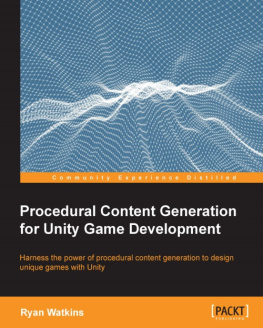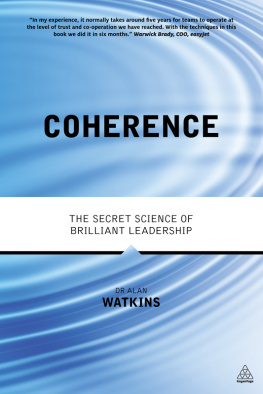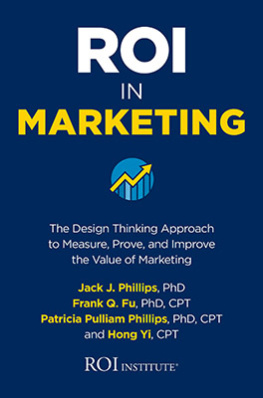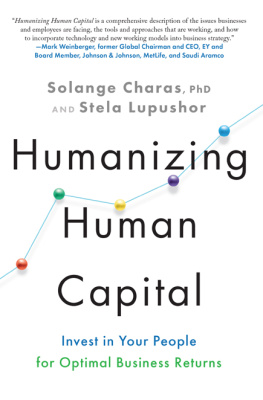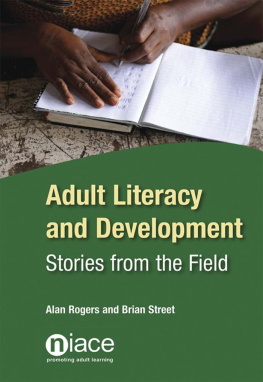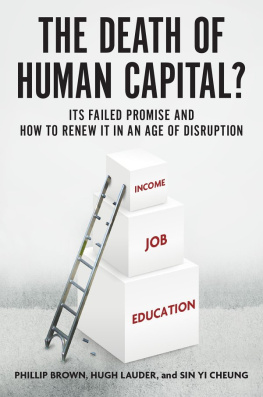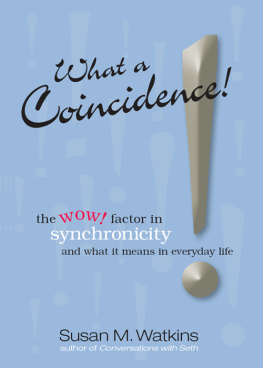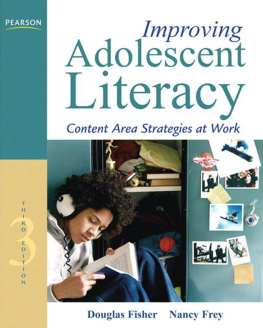Watkins - Literacy Work in the Reign of Human Capital
Here you can read online Watkins - Literacy Work in the Reign of Human Capital full text of the book (entire story) in english for free. Download pdf and epub, get meaning, cover and reviews about this ebook. publisher: Fordham University Press, genre: Romance novel. Description of the work, (preface) as well as reviews are available. Best literature library LitArk.com created for fans of good reading and offers a wide selection of genres:
Romance novel
Science fiction
Adventure
Detective
Science
History
Home and family
Prose
Art
Politics
Computer
Non-fiction
Religion
Business
Children
Humor
Choose a favorite category and find really read worthwhile books. Enjoy immersion in the world of imagination, feel the emotions of the characters or learn something new for yourself, make an fascinating discovery.

- Book:Literacy Work in the Reign of Human Capital
- Author:
- Publisher:Fordham University Press
- Genre:
- Rating:3 / 5
- Favourites:Add to favourites
- Your mark:
- 60
- 1
- 2
- 3
- 4
- 5
Literacy Work in the Reign of Human Capital: summary, description and annotation
We offer to read an annotation, description, summary or preface (depends on what the author of the book "Literacy Work in the Reign of Human Capital" wrote himself). If you haven't found the necessary information about the book — write in the comments, we will try to find it.
Watkins: author's other books
Who wrote Literacy Work in the Reign of Human Capital? Find out the surname, the name of the author of the book and a list of all author's works by series.
Literacy Work in the Reign of Human Capital — read online for free the complete book (whole text) full work
Below is the text of the book, divided by pages. System saving the place of the last page read, allows you to conveniently read the book "Literacy Work in the Reign of Human Capital" online for free, without having to search again every time where you left off. Put a bookmark, and you can go to the page where you finished reading at any time.
Font size:
Interval:
Bookmark:
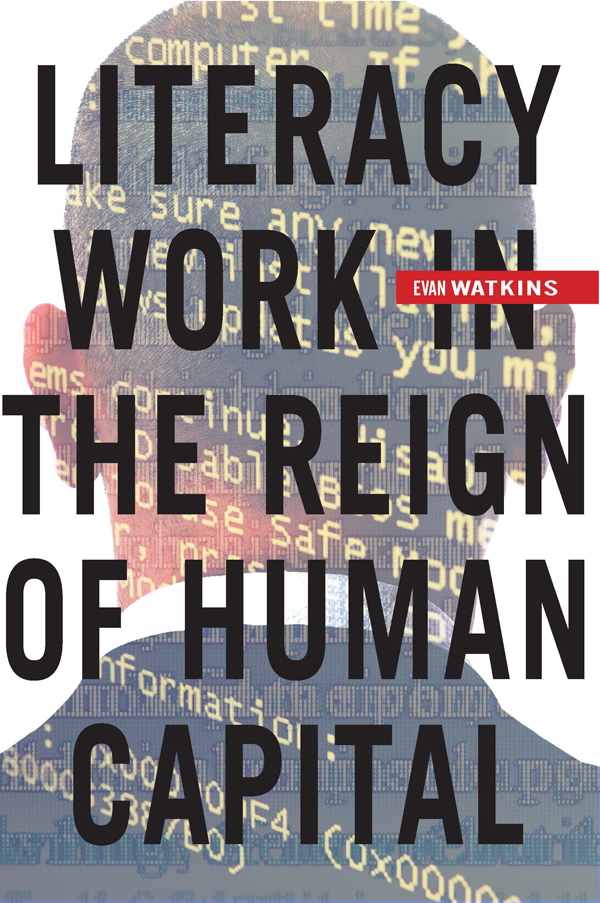
Literacy Work in the Reign of Human Capital
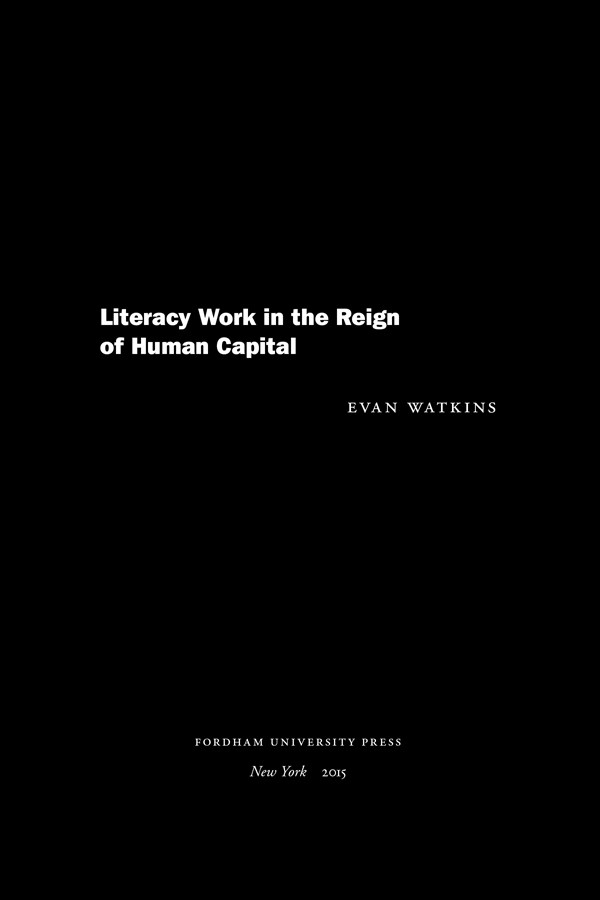
Copyright 2015 Fordham University Press
All rights reserved. No part of this publication may be reproduced, stored in a retrieval system, or transmitted in any form or by any meanselectronic, mechanical, photocopy, recording, or any otherexcept for brief quotations in printed reviews, without the prior permission of the publisher.
Fordham University Press has no responsibility for the persistence or accuracy of URLs for external or third-party Internet websites referred to in this publication and does not guarantee that any content on such websites is, or will remain, accurate or appropriate.
Fordham University Press also publishes its books in a variety of electronic formats. Some content that appears in print may not be available in electronic books.
Visit us online at www.fordhampress.com.
Library of Congress Cataloging-in-Publication Data available online at catalog.loc.gov.
Printed in the United States of America
17 16 15 5 4 3 2 1
First edition
for Diane
Contents
I have mined David Ruccios expertise about all things economic that appear in this book, from Adam Smith and Marx to Oliver Williamson, and I have benefited over and over from his generous willingness to share that expertise. I want to thank Ann Miller for a superb job of copy editing, making far more of the manuscript intelligible than I would have thought possible. I am fortunate to write surrounded by family support. I rely more than anything on my wife, Diane Logan Watkins, and my son and daughter-in-law, Christopher Watkins and Amy Marinelli. Chriss wide-ranging knowledge of digital literacies, literacy uses, and business practices that involve multiple literacies has been especially invaluable for this book. And my wondrous and magical grandchild, Clara Bay, limns the literacies to come.
I was blessed to work with Helen Tartar for more than thirty-five years and now five books. Everything seemed to belong within her vast orbit of passionate intelligence, and like everyone she knew, Ill miss her so much.
Literacy Work in the Reign of Human Capital
Over the past decade the growing use of unpaid interns has drawn legal as well as political attention. Lengthy analyses have appeared in Atlantic and the New York Times , among other publications, and a quick Web search can turn up a number of sites that offer help with lawsuits for those who feel victimized. The concern, of course, is that employers are simply taking advantage of the soft job market to extort free labor from applicants desperate for positions. The 29 January 2010 Department of Labor guidance letter for training and employment identifies education as the primary purpose of unpaid internships, and the six criteria for unpaid trainees that it spells out are strict. The first of the six is that the training offered should be similar to what might be given by an institution for vocational or academic education. The second is that the training must be for the benefit of the trainees. Neither criterion precludes the individual from performing typical operations required at the workplace. The fourth criterion, however, forcefully states that the employer cannot gain immediate advantage from trainee activity and adds that from time to time employer operations may well be impeded by the presence of the trainee. Media accounts critical of the proliferation of unpaid positions question the extent to which either the first or the fourth criterion is widely observed. Yet even critical accounts sometimes concede that the trainee may receive intangible benefits from an internship, which might include gaining a behind-the-scenes understanding of how the business or profession actually works; a pipeline awareness of key players and how they might influence job possibilities; and simply the fact of being on the spot and (the trainee can hope) demonstrating his or her abilities. The fifth Department of Labor criterion makes explicit that trainees are not entitled to a job at the end of the training period, but the intangibles can seem sufficient to give the trainee a vital edge over others who apply for openings.
The position of an unpaid intern may appear to have very little in common with a wide range of ordinary activities in which a great many of us engage. The federal criteria for unpaid positions, however, help reveal some surprising connections as well as obvious differences. Even a simple ATM transaction, for example, requires at least some degree of customer knowledge, but it offers nothing by way of education, the key stipulation throughout the Department of Labor guidance letter. Yet according to the letters first criterion, what actually goes on in the brief period we spend at the ATM sounds very similar to what might happen at any given moment during a temporary unpaid intern position. Like a bank teller, an ATM customer taps codes into a machine (owned or leased by the financial institution or the network to which the institution belongs) that dispenses cash. That is, the ATM customer is in the position of a trainee engaged, in the words of the first criterion, in the actual operation of the facilities of the employer. Our moment at the ATM is like a preview pane for some more extended process of unpaid intern work.
The Department of Labor criteria for traineeships also help pinpoint the problem with a frequent and convenient misrepresentation of the larger context for what is going on with ATMs. It is not really the case that an automated teller machine has replaced a human bank teller. In the recent past, new bank branches meant more teller hires, but the Occupational Outlook Handbook notes that branch growth has now slowed. Additionally, the Handbook continues, online and mobile banking allows customers to handle many of the same transactions as tellers do. While there are still numbers of jobs available for bank tellers, it is because many workers leave this occupation. In short, what has happened is not that the machine has replaced the teller. Work practices by customers at multiple locations have replaced typical work practices by tellerspaid employees working in the bank. Like an unpaid intern using actual employer facilities, the customer now does the primary work of the transaction, quite often in circumstances in which that customer also pays a fee. Such a transaction is obviously at odds with the intent of the Labor Departments criterion 3 for traineeships, which states that rather than displacing regular employees, trainees must work under their supervision. Further, in violation of what criterion 4 stipulatesand without even factoring in ATM feesthe financial institution, which in this comparison occupies the position of an employer, can benefit a great deal from these and similar kinds of transactions such as online banking, as I will discuss in subsequent chapters.
At the same time, it would hardly be accurate to say that customers receive no benefits from ATM transactions. Education may not be included, but convenience is advertised as a major plus, and the convenience depends on an expanded range of choice. Many different ATMs in many different locations, open twenty-four hours a day, mean that to a much greater extent than in the past, customers can obtain cash as they choose rather than in conformity with bank hours and locations and via waiting in lines at teller windows. Mobile bankingsuch as from ones computer or mobile deviceis becoming more and more popular, but when cash is necessary, the benefits of ATM use would seem to outweigh the relatively minor annoyance of performing the transaction oneself and paying a fee. According to a recent widely reported study entitled The Cost of Cash in the United States by Bhaskar Chakravorti and Benjamin Mazzotta of the Institute for Business in a Global Context at the Fletcher School of Tufts University, however, there are large social costs associated with cash use. The most insidious is how it exacerbates the inequality that currently seems to be on everyones mind. The study concludes that the poor and the unbanked are the biggest users of cash in relation to other payment methods, and they pay the highest fees to obtain cash when they can. Rather than the combination of convenience and choice usually touted as an advantage to ATM users, the Institutes research data suggest that in these circumstances, having no choice might well be a much better descriptor for some ATM users, as well as for those who are not in a position to use ATMs at all.
Font size:
Interval:
Bookmark:
Similar books «Literacy Work in the Reign of Human Capital»
Look at similar books to Literacy Work in the Reign of Human Capital. We have selected literature similar in name and meaning in the hope of providing readers with more options to find new, interesting, not yet read works.
Discussion, reviews of the book Literacy Work in the Reign of Human Capital and just readers' own opinions. Leave your comments, write what you think about the work, its meaning or the main characters. Specify what exactly you liked and what you didn't like, and why you think so.




